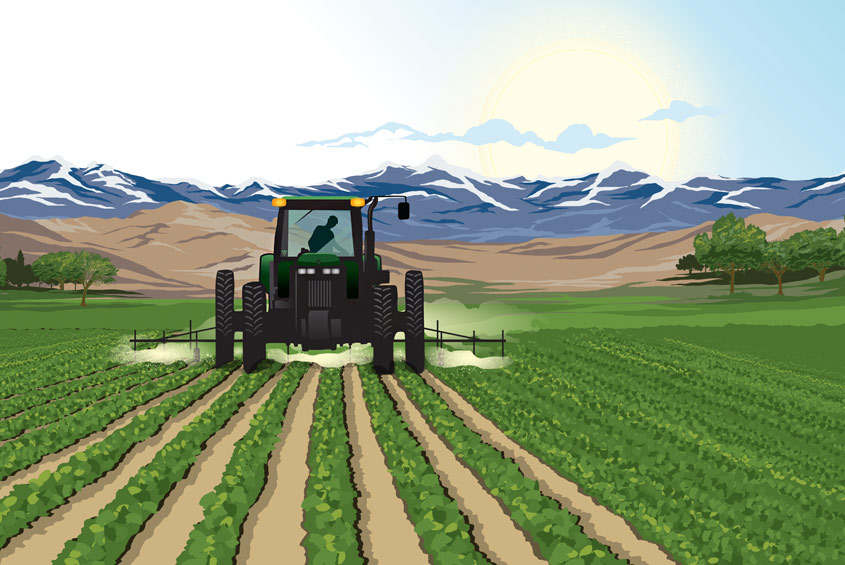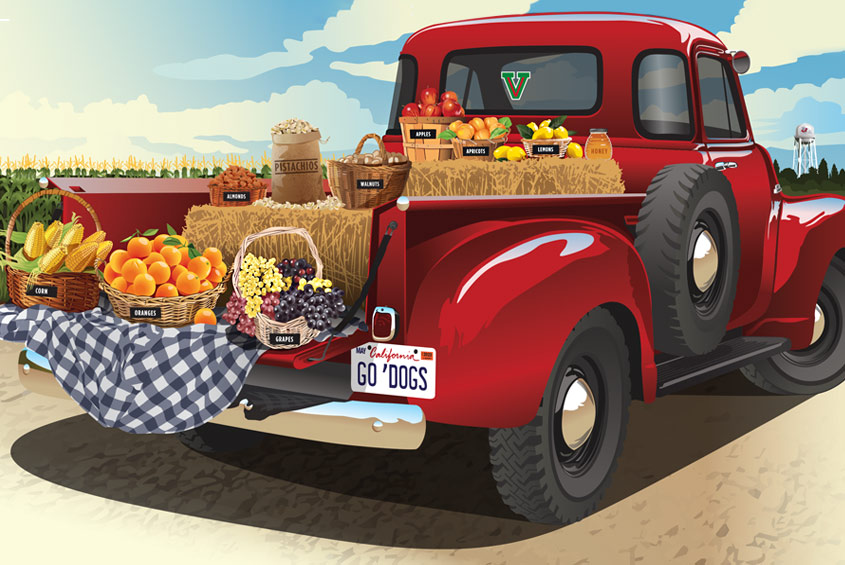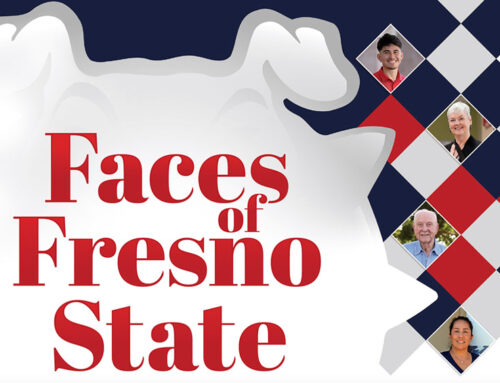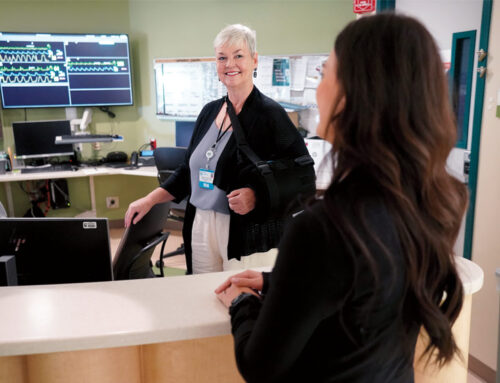Agriculture: Valley’s leading industry backed by region’s leading ag college
By Esra Hashem (’13, ’16, ’21)
Illustrations by Todd Graves (’03) and Joel Beery (’08)
After a days-long March storm passes the Central Valley, the sun finally shines bright atop the Sierra Nevada mountain range. Its rays highlight the lush, green agriculture settled in this region — the crop rows glistening in the morning light.
This is the region that feeds the world. More than 300 different crops are grown in the Valley, with an estimated value of $17 billion per year. Though the region encompasses fewer than 1% of U.S. farmland, the Valley supplies 8% of U.S. agricultural output — producing a quarter of the nation’s food, including 40% of the nation’s fruits, nuts and other table foods.
Its people, many who have been rooted on this rich soil for generations, exude dedication and grit when growing the food that ends up in refrigerators and pantries around the world.
Many of these people got their start at Fresno State.
“Getting an education at Fresno State broadened my life and made me a stronger person,” says alumnus Joe Gambini. The Valley native is a local farmer who graduated from the university in 1956. “I had the chance to go to [UC] Davis and Cal Poly, but I chose to go to Fresno State because it was the best for studying row crops. There’s so much opportunity for young people interested in agriculture at Fresno State.”
Fresno State is one of the top agricultural schools in California. Faculty take a leadership role in researching water management,and institutes like Fresno State’s California Water Institute are pivotal in advancing agricultural solutions.
The university’s Jordan College of Agricultural Sciences and Technology houses 20 undergraduate and graduate degrees and educates about 2,000 students each year. Its majors span from the science of food, plants and animals, to the business operations and industrial technology side of agriculture.
This disciplinary breadth is crucial in the region. According to the Fresno County Farm Bureau, farmers support 20% of all jobs in the Fresno area. Fresno State ag graduates hold positions in management, sales, animal care, production, communications, research, education, quality assurance and more.
“The relevancy of our students’ training has resulted in them being embedded at all levels of the California agricultural industry,” says Dr. Rolston St. Hilaire, dean of the Jordan College.
The first agricultural courses were taught at Fresno State in 1914, with an official agricultural academic program launching in 1922. Since then, over 22,000 Bulldog alumni have graduated with agricultural degrees.
Fresno State students gain hands-on skills they wouldn’t elsewhere. The university houses a 1,000-acre campus farm — the University Agricultural Laboratory — which contains 18 enterprises, including a vineyard, vegetable crops and beef, sheep and swine units, among others. Students operate the units, growing products that are sold at the university’s Gibson Farm Market, the Fresno State Creamery and the Fresno State Winery (the nation’s first and largest commercial winery on a college campus).
Even before graduation, students use their skills to impact the agricultural industry. Recent data showed nearly 80% of undergraduates in the Jordan College participated in internships, field experiences, clinical experiences, service learning, study abroad internship/practicum and/or research. More than half of undergraduate interns participated in at least two internships, and 49.2% of students said their internships led to full-time employment.
“Students from Jordan College comment that they feel prepared for careers in the agricultural industry because the classroom curriculum was supported with the real-world experiences at the University Agricultural Laboratory,” St. Hilaire says.
Margaret Fernando, a student studying plant science, is working on research with professor Dr. Anil Shrestha. She is studying cover crops, which are used to improve soil health and enhance water availability. Despite a year of promising rain in the Valley, what she is studying is critical for sustainable agriculture. The research is in partnership with the United States Department of Agriculture.
The research is in partnership with the United States Department of Agriculture.
“Science is something that you can’t just learn with a textbook. It’s something you have to be able to practice, and I am able to do that at Fresno State,” Fernando says. “There are a lot of opportunities at Fresno State to connect with local growers and be involved with the community.”
Fernando will soon graduate and join Gambini — and the thousands of fellow Fresno State alumni — who work together to make Valley agriculture a growing success.
– Esra Hashem is the associate director of Brand Strategy and Marketing at Fresno State.
Can you imagine the Valley without Fresno State?
Neither can we. And that’s why, with continued support from alumni and the community, Fresno State is committed to educating and enhancing the future of agriculture locally, nationally and globally, from food and animal products, to wine and water research and sustainability.
At a glance
300+ different crops are grown in the Valley, with an estimated value of $17 billion per year
40% of the nation’s fruits, nuts and other table foods are grown in the Valley
22,000+ graduates from the Jordan College of Agricultural Sciences and Technology
80% Jordan College undergraduates engage in hands-on experiences like internships or research







